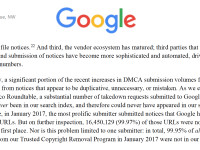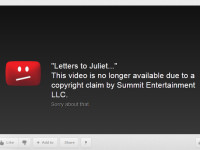The Canadian Bar Association appeared before the Standing Committee on Industry, Science and Technology earlier this week as part of the nearly-concluded copyright review. The CBA submitted an odd brief that focused on a mix of issues, including anti-counterfeiting, notice-and-notice, and artists’ resale rights. The notice-and-notice comments captured the attention of at least one MP, who was left puzzled by the position.
Post Tagged with: "notice and takedown"
Music Industry’s Canadian Copyright Reform Goal: “End Tech Companies’ Safe Harbours”
Miranda Mulholland, a Toronto-based musician and music label owner, delivered an exceptionally passionate, accessible, and deeply personal keynote speech last week to the Economic Club of Canada. Mulholland’s talk was notable not only for providing an artist’s perspective, but for coming ready with next steps for everyone. She urged artists to create and protect their intellectual property, consumers to create playlists, write reviews, go to shows, and subscribe to digital music services, the music industry to be upfront about payment, to better support artists (including providing daycare services), and to pay for tickets to their own artists (Kate Taylor offered her take on the talk here, which includes an incredible comment from Music Canada that it wants only a level playing field, not public money. Music Canada has spent the last few years successfully lobbying for tens of millions in taxpayer support from provincial governments).
Given the active support from Music Canada for the event, her recommendations for policy makers were a core part of her message and largely mirror those of the industry. Unlike the 2010-2012 copyright reform process, piracy is no longer a key issue. Indeed, the issue of peer-to-peer file sharing and unauthorized downloading was not even mentioned in the speech. With the Canadian digital music market enjoying remarkable growth – Canada leaped ahead of Australia last year to become the 6th largest music market in the world and SOCAN generated record revenues – the industry focus is no longer on whether the public is paying for music (they are) but whether they are paying enough.
Bogus Claims: Google Submission Points to Massive Fraud in Search Index Takedown Notices
The U.S. DMCA notice-and-takedown system has generated heated debate for many years with supporters arguing that the safe harbour is essential, while rights holder critics countering that the growing number of takedown notices sent to Google illustrates mounting piracy concerns. In recent months, there have been several reports that raise questions about the reliability of takedown notices. A study released last year by the University of California, Berkeley and Columbia University found that approximately 30% of notices were questionable, while TorrentFreak report this week identified tens of millions of fake DMCA takedown notices sent to Google on a website with virtually no traffic. An earlier report also raised questions about dubious takedown practices.
Yet those reports pale in comparison to data just released by Google in its submission to the Register of Copyrights as part of the review of the DMCA notice-and-takedown system. Google reports that the overwhelming majority of takedown notices sent to Google Search through its Trusted Copyright Removal Program do not involve pages that are actually in its search index. The submission states:
The Trouble with the TPP, Day 4: Copyright Notice and Takedown Rules
The Trouble with the TPP series focuses today on the TPP’s effort to regulate how Internet providers and hosts address allegations of copyright infringement on their networks and sites (prior posts include Day 1: US Blocks Balancing Provisions, Day 2: Locking in Digital Locks, Day 3: Copyright Term Extension). The goals of the U.S. and Canadian government in the negotiations were clear from the outset: the U.S. wanted to export its DMCA notice-and-takedown system to the rest of the TPP, while Canada wanted to preserve its newly created notice-and-notice approach (more on the notice-and-notice system, which does a better job of striking a balance and preserving user privacy, here). In fact, Canada rushed through the notice-and-notice system without regulations (causing major problems of misleading notices) in order to argue that it should not be required to adopt the U.S. approach.
The end result is a compromise that allows Canada to maintain notice-and-notice, but no other TPP country can adopt it in order to comply with the ISP liability and notice rules. The Canadian rules can be found in Annex 18-E, which states that the standard TPP ISP rules do not apply to a country that meets the conditions of the annex “as from the date of agreement in principle of this Agreement.” Since that date is now long passed (October 4, 2015), no other TPP country can implement the notice-and-notice system to meet its TPP obligations. It should be noted that Chile, which objected to the special treatment for Canada, obtained a similar exception for its system based on the U.S. – Chile Free Trade Agreement in Annex 18-F.
Maritime Band Facing False Takedown Notices From Universal Music
The CBC reports that the Maritime band In-Flight Safety has faced multiple false YouTube takedowns by major record label Universal Music. The band has no connection to Universal Music Group, yet the label has ordered the takedown of five of the band’s songs.










